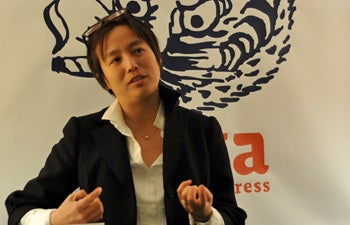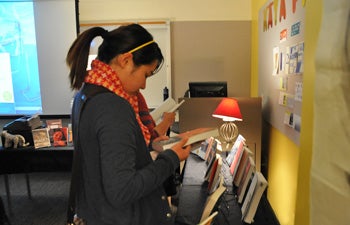Kaya Press Moves from New York to USC Dornsife
In her first book, Magnetic Refrain, Nicky Sa-Eun Schildkraut, a Ph.D. student in literature and creative writing in USC Dornsife, frames her poetry collection around themes of loss and waves of diasporic flight as a result of the Korean War.
Schildkraut’s poems that feature historical subjects including war brides, North Korean refugees, Korean birthmothers and adoptions will be published in September 2012 by the leading independent press of Asian American literature in the United States, Kaya Press, now housed in USC Dornsife’s Department of American Studies and Ethnicity (ASE).
Founded in 1994, Kaya Press has been publishing cutting-edge Asian and Pacific Islander diasporic writers for more than 15 years. It has moved from New York to metropolitan Los Angeles, home to the nation’s largest Asian American population at 1.9 million.
“USC recognizes what being at the forefront of the ‘Pacific Century’ means,” said Sunyoung Lee, visiting faculty of East Asian Studies Center housed in USC Dornsife and Kaya Press publisher and editor, referring to the rise of Asia-Pacific economies during the 21st century. “It understands the role that arts and cultures play in a dynamic and interdisciplinary environment.”

Sunyoung Lee, visiting faculty of East Asian Studies Center housed in USC Dornsife and Kaya Press publisher and editor, addresses guests at the launch party. Photo by Ambrosia Brody.
The presence of Kaya Press at ASE will help bolster research on issues stemming from the Pacific Rim, said Macarena Gomez Barris, ASE interim chair and associate professor of sociology, whether in a scholarly or creative vein.
“Asian American studies and transnational studies are increasingly important to the missions of USC and ASE,” Gomez Barris said. “Part of ASE’s vision is to talk about the real questions of how recent Asian immigrant populations are racialized and face discriminatory structural practices. Yet we’re also as much focused on the expressive dimensions of Asian literature that Kaya so beautifully produces.”
Kaya in Kaya Press was the name of a tribal confederation of six Korean city-states that existed from the middle of the first century until the sixth century, an era in which learning, music and the arts flourished.
John Rowe, USC Associates Chair in Humanities and professor of English and ASE, noted that Kaya Press at USC stresses ASE’s commitment to connect scholarly knowledge and the creative arts with the general public.
Kaya Press also gives Los Angeles a larger Asian American literary presence.
“It’s an enormous boon to the Asian American literary scene in L.A. and sends a signal to the rest of the country that there is now a focal point for such literature,” said Viet Thanh Nguyen, associate professor of ASE and English.
Works published by Kaya Press tend toward the non-traditional, challenging readers’ understanding of what Asian American life really is. For example, publications run the gamut from Sesshu Foster’s City Terrace Field Manual, a book of poetry exploring violence and racism in a Chicano neighborhood, to Rolling the R’s, a book written by R. Zamora Linmark in Hawaiian Pidgin discussing homosexuality in Hawaii in the 1970s.
Another book, Lament in the Night by Shôson Nagahara, explores what it means to be a non-English speaking Japanese immigrant in America. Translated from Japanese to English and published Spring 2012, the book will be prefaced by David Ulin, a lecturer in USC Dornsife’s Master of Professor Writing program.
Students are invited to volunteer in the day-to-day operations of Kaya Press. Lee, USC graduate and undergraduate students from schools across campus are responsible for all aspects of publishing.

USC students browse books published by Kaya Press. Photo by Ambrosia Brody.
USC Dornsife’s Jennifer Reynolds-Kaye, an art history doctoral candidate, recently became involved in Kaya Press so she could pursue her interest in the publication process.
“I want to develop new ways of thinking about how writers can get their works published,” Reynolds-Kaye said. “And find ways to incorporate public participation in events such as book readings and social media outlets.”
At USC, Kaya Press will form book clubs, and hold writing workshops and a performance art series. A Jan. 19 Kaya Press launch party held in Kaprielian Hall on USC’s University Park campus included readings from several authors.
At the launch party for Kaya Press, Schildkraut read “The Unfilial Daughter,” a poem from her collection Magnetic Refrain. The poem is a creative response to a Korean folktale in which a girl transforms into a fox at night, emerging as a figure of retaliation within her family. In her version, Schildkraut illustrates the irony of the reversal of memory and violence:
She resembled an animal, but he couldn’t tell which.
I’m a fox, she said. Of course, he said, in disbelief.
Tell me what you can do, he challenged.
But she never remembered. At night,
she became someone else, and by dawn, returned
hungry. And so he began to watch her,
following her shadow, until he became fuller.
In the darkness, he saw her wild tail
growing longer, tearing up the lake into waves,
and felt envious that she could swim away
while he would drown. I need you
to catch that yellow fish, he ordered her. That poisonous tail
needs to be cooked in order to cure my mother.
She had dreamt of them, before, her family
stirring inside a soup of feathers and fur
before she devoured them, completely.
Aren’t you hungry, too? her mother would say,
and she always answered, yes, tearfully,
but I’d rather not remember.
For more information on how to get involved in Kaya Press, visit kaya.com or send an e-mail to kaya@kaya.com